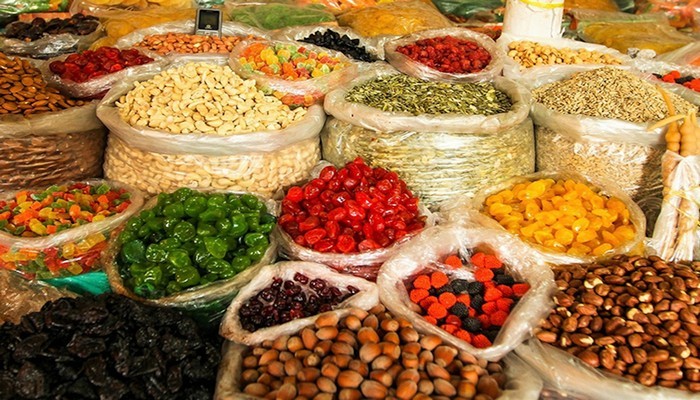
TBILISI, GEORGIA - JUL 18: Sale of agricultural products on central food market, Jul 18, 2011 in Tbilisi, Georgia. Suitable for farming areas account only for 16% of total territory of the country.
The Federal Government has confirmed an 80 percent increase in food importation to the country between 2019 and 2023.
Dr Kingsley Uzoma, Senior Special Assistant to the President on Agribusinesses and Productivity Enhancement (SSAP), made this disclosure at the National Policy Dialogue on Thursday in Abuja.
He also added that no fewer than 88.5 million Nigerians were faced with insufficient food consumption while the figure was projected to increase by six million in December.
The policy dialogue was themed “Deepening Partnership for Scaling-Up of Information and Communication Technology for Development (ICT4D) for Smallholder Farmers in Nigeria,” and was organized Federal Government, the International Fund for Agricultural Development (IFAD), and the National Information and Technology Development Agency (NITDA).
According to Uzoma, the Federal Government is committed to reversing the trend.
He stressed that the nation held the highest global rate of stunted children, with 70 per cent of its population residing below the poverty line. Furthermore, in October, food inflation recorded a notable 31.52 per cent.
“This escalating dependence on external sources further intensifies the challenges within the domestic food landscape all of which have resulted in the declaration of state of emergency in food security by Mr President.
“The IFAD-financed programme such as Value Chain Development Programme (VCDP) and Livelihood Improvement and Family Enterprises Project for the Niger Delta (LIFE-ND), aims to enhance incomes and food security through sustainable practices and integration of ICT4D.
“These programmes involve tools such as the Mini-weather Station (Nimet) and Agriculture Market Information System (AIMS) to benefit farmers.
“However, challenges in data access, gender equality, infrastructure, and technical support still exist,” he said.
He attributed the development to the decline in agricultural production which compelled the country to rely heavily on food imports.
He therefore urged continuous initiatives in digital literacy and collaboration among agencies and the private sector. These efforts are crucial to fostering increased technology adoption among smallholder farmers.
Uzoma emphasized that such endeavours could lead to increased productivity, extensive technical advancement, the promotion of best practices, enhanced trade competitiveness, and improved market access.
“Increased collaboration with the Federal Ministry of Agriculture and Food Security and the NITDA is necessary to implement the National Digital Agriculture Strategy to further leverage technology for the advancement of the agricultural sector.
“These aligned with the mandate of my office under the leadership of the vice president which encompasses a multifaceted approach rooted in technology and innovation to ensure transformative change in Nigeria’s agricultural sector.
“This includes empowering one million women, youths, and minorities to achieve food and nutritional sovereignty, ensuring food security and heightened agricultural productivity,” Uzoma stated.
In addition, IFAD Country Director, Dede Ekoue, said the dialogue was aimed at strengthening partnership for enhanced access of smallholder farmers to digital solutions.
According to her, implementing these solutions is expected to elevate their livelihoods while simultaneously making significant contributions to food security, nutrition, poverty reduction, economic growth, and job creation.








